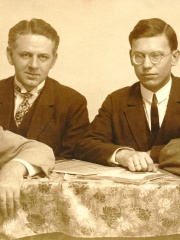
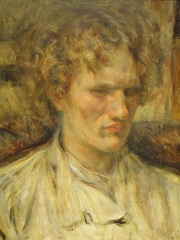
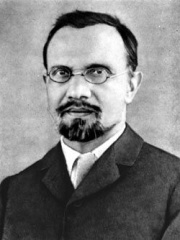
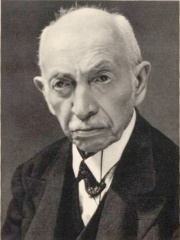
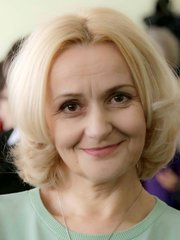
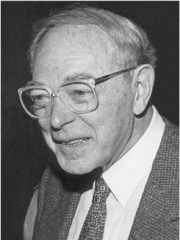

The Most Famous
LINGUISTS from Ukraine
This page contains a list of the greatest Ukrainian Linguists. The pantheon dataset contains 214 Linguists, 8 of which were born in Ukraine. This makes Ukraine the birth place of the 8th most number of Linguists behind Denmark, and Switzerland.
Top 8
The following people are considered by Pantheon to be the most legendary Ukrainian Linguists of all time. This list of famous Ukrainian Linguists is sorted by HPI (Historical Popularity Index), a metric that aggregates information on a biography's online popularity.

1. Edgar de Wahl (1867 - 1948)
With an HPI of 81.92, Edgar de Wahl is the most famous Ukrainian Linguist. His biography has been translated into 102 different languages on wikipedia.
Edgar von Wahl (Interlingue: Edgar de Wahl, born Edgar Alexis Robert von Wahl; 23 August 1867 – 9 March 1948) was a Baltic German mathematics and physics teacher who lived in Tallinn, Estonia. He also used the pseudonym Julian Prorók, and is best known as the creator of Interlingue, an international auxiliary language that was known as Occidental throughout his life. He was born to the Baltic German noble von Wahl family in the then Russian Empire and spent most of his childhood in Tallinn (Reval) and the capital Saint Petersburg. He studied at the University of Saint Petersburg and at the Saint Petersburg Academy of Arts. During and after his studies he served in the navy. After completing the military service in 1894 he lived permanently in Tallinn and worked as a teacher. During World War II, when most Baltic Germans left Estonia in 1939–1941, he decided to stay. He was arrested in 1943 by the Nazi German occupation authorities and placed in a psychiatric clinic because of alleged dementia. He stayed there until his death in 1948. Wahl was engaged with interlinguistics from an early age. He was first introduced to Volapük by his father's colleague Waldemar Rosenberger and even started to compose a lexicon of marine terminology for the language, before turning to Esperanto in 1888. After the failure of Reformed Esperanto in 1894, of which Wahl had been a proponent, he started work to find an ideal form of an international language. In 1922, he published a "key" to a new language, Occidental, and the first edition of the periodical Kosmoglott (later Cosmoglotta). Wahl developed the language over several decades on the advice of its speakers, but became isolated from the movement (then centred in Switzerland) from 1939 after the start of World War II.

2. Vasili Eroshenko (1890 - 1952)
With an HPI of 61.79, Vasili Eroshenko is the 2nd most famous Ukrainian Linguist. His biography has been translated into 22 different languages.
Vasili Yakovlevich Eroshenko (Russian: Василий Яковлевич Ерошенко Ukrainian: Василь Якович Єрошенко) (12 January 1890 – 23 December 1952) was a blind writer, translator, esperantist, linguist, traveler, poet and teacher. He wrote in Esperanto and Japanese.

3. Ahatanhel Krymsky (1871 - 1942)
With an HPI of 60.67, Ahatanhel Krymsky is the 3rd most famous Ukrainian Linguist. His biography has been translated into 28 different languages.
Ahatanhel Yukhymovych Krymsky (Ukrainian: Агатангел Юхимович Кримський, Russian: Агафа́нгел Ефи́мович Кры́мский, romanized: Agafangel Yefimovich Krymsky; Crimean Tatar: Agatangel Krımskiy; 15 January [O.S. 3 January] 1871 – 25 January 1942) was a Ukrainian Orientalist, linguist, polyglot (knowing up to 35 languages), literary scholar, folklorist, writer, and translator. He was one of the founders of the All-Ukrainian Academy of Sciences (VUAN) in 1918 and a full member of it and the Shevchenko Scientific Society from 1903. Although Krymsky was not ethnically Ukrainian, he described himself as a "Ukrainophile". In 1941, he was arrested by the Soviet authorities as "Ukrainian nationalist," an "ideologist of Ukrainian nationalists", and a "head of nationalistic underground". He was convicted in "Anti-Soviet nationalistic activities" and imprisoned in Kustanay General Prison No.7 (today near Kostanay, Kazakhstan).

4. Aleksander Brückner (1856 - 1939)
With an HPI of 57.59, Aleksander Brückner is the 4th most famous Ukrainian Linguist. His biography has been translated into 20 different languages.
Aleksander Brückner (Polish pronunciation: [alɛkˈsandɛr ˈbryknɛr]; 29 January 1856 – 24 May 1939) was a Polish scholar of Slavic languages and literature (Slavistics), philologist, lexicographer, and historian of literature. He is among the most notable Slavicists of the late 19th and early 20th centuries, and the first to prepare complete monographs on the history of the Polish language and culture. He published more than 1,500 titles and discovered the oldest extant prose text in Polish (the Holy Cross Sermons).
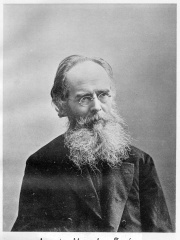
5. Alexander Potebnja (1835 - 1891)
With an HPI of 57.51, Alexander Potebnja is the 5th most famous Ukrainian Linguist. His biography has been translated into 18 different languages.
Alexander Afanasyevich Potebnja (Russian: Алекса́ндр Афана́сьевич Потебня́; Ukrainian: Олекса́ндр Опана́сович Потебня́, romanized: Oleksandr Opanasovych Potebnia; September 22, 1835 – December 11, 1891) was a Russian Imperial linguist, philosopher and pan-Slavist of Ukrainian Cossack descent, who was a professor of linguistics at the Imperial Kharkov University. He is well known as a specialist in the evolution of Russian phonetics. He constructed a theory of language and consciousness that later influenced the thinking of his countryman the Psychologist Lev Vygotsky. His main work was Language and Thought (Russian: Мысль и язык) (1862). He also published a number of works on Russian Grammar, on the History of the Sounds in the Russian Language and on Slavic folk poetry, furthermore he translated a short fragment of Homer's Odyssey into Ukrainian. Potebnja was a corresponding member of the St. Petersburg Academy of Sciences, the foremost academic institution in the Russian Empire.

6. Iryna Farion (1964 - 2024)
With an HPI of 56.25, Iryna Farion is the 6th most famous Ukrainian Linguist. Her biography has been translated into 26 different languages.
Iryna Dmytrivna Farion (Ukrainian: Ірина Дмитрівна Фаріон, pronounced [iˈrɪnɐ ˈdmɪtr⁽ʲ⁾iu̯nɐ fɐr⁽ʲ⁾iˈɔn]; 29 April 1964 – 19 July 2024) was a Ukrainian linguist and nationalist politician who served as a deputy in the Verkhovna Rada from 2012 to 2014 as a member of Svoboda. She was a professor at the Department of Ukrainian Language at Lviv Polytechnic's Institute of Humanitarian and Social Sciences. She was known for her campaigns to promote the Ukrainian heritage language learning as a part of decolonisation, and for her vocal criticism of Ukrainians who spoke Russian. Farion was assassinated outside of her home on 19 July 2024.

7. Zellig Harris (1909 - 1992)
With an HPI of 54.74, Zellig Harris is the 7th most famous Ukrainian Linguist. His biography has been translated into 19 different languages.
Zellig Sabbettai Harris ( ZELL-ihg; October 23, 1909 – May 22, 1992) was an American linguist, mathematical syntactician, and methodologist of science widely considered to have been influential in his fields. Originally a Semiticist, he is best known for his work in structural linguistics and discourse analysis and for the discovery of transformational structure in language. These developments from the first 10 years of his career were published within the first 25. His contributions in the subsequent 35 years of his career include transfer grammar, string analysis (adjunction grammar), elementary sentence-differences (and decomposition lattices), algebraic structures in language, operator grammar, sublanguage grammar, a theory of linguistic information, and a principled account of the nature and origin of language.

8. Vladislav Illich-Svitych (1934 - 1966)
With an HPI of 53.28, Vladislav Illich-Svitych is the 8th most famous Ukrainian Linguist. His biography has been translated into 15 different languages.
Vladislav Markovich Illich-Svitych (Russian: Владисла́в Ма́ркович И́ллич-Сви́тыч, also transliterated as Illič-Svityč; 12 September 1934 – 22 August 1966) was a Soviet linguist and accentologist. He was a founding father of comparative Nostratic linguistics and the Moscow School of Comparative Linguistics.
People
Pantheon has 8 people classified as Ukrainian linguists born between 1835 and 1964. Of these 8, none of them are still alive today. The most famous deceased Ukrainian linguists include Edgar de Wahl, Vasili Eroshenko, and Ahatanhel Krymsky. As of April 2024, 1 new Ukrainian linguists have been added to Pantheon including Iryna Farion.
Deceased Ukrainian Linguists
Go to all RankingsEdgar de Wahl
1867 - 1948
HPI: 81.92
Vasili Eroshenko
1890 - 1952
HPI: 61.79
Ahatanhel Krymsky
1871 - 1942
HPI: 60.67
Aleksander Brückner
1856 - 1939
HPI: 57.59
Alexander Potebnja
1835 - 1891
HPI: 57.51
Iryna Farion
1964 - 2024
HPI: 56.25
Zellig Harris
1909 - 1992
HPI: 54.74
Vladislav Illich-Svitych
1934 - 1966
HPI: 53.28
Newly Added Ukrainian Linguists (2025)
Go to all RankingsOverlapping Lives
Which Linguists were alive at the same time? This visualization shows the lifespans of the 8 most globally memorable Linguists since 1700.

